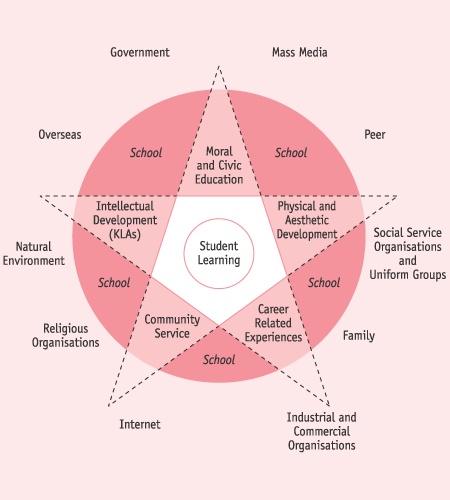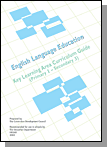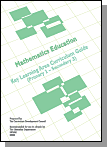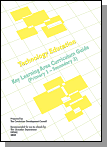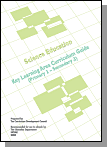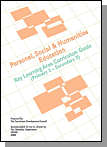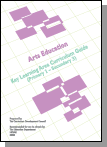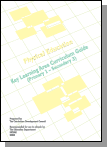 |
| Contents |
| |
| 6 Life-wide Learning
|
| |
| This is one of the chapters of the Basic Education Curriculum Guide - To Sustain, Deepen and Focus on Learning to Learn (Primary 1 - 6). Its contents are as follows: |
| 6.1 Background |
| 6.2 Purposes of the Chapter |
| 6.3 Aims and Meaning of Life-wide Learning: Relationship with Curriculum |
| 6.4 Life-wide Learning for Five Essential Learning Experiences |
| 6.5 Action Planning for Life-wide Learning in the Whole-school Curriculum |
| |
6.5.1 |
Key Emphases of Life-wide Learning for School Curriculum at Different Key Stages |
| |
6.5.2 |
Life-wide Learning, Classroom Learning in KLAs and Five Essential Learning Experiences Complementing Each Other |
| |
6.5.3 |
Quality Reflection: Key to Turning Experiences into Learning |
| |
6.5.4 |
Key Issues and Considerations for Life-wide Learning Opportunities |
| 6.6 Issues of Life-wide Learning |
| References |
|
| |
| |
| 6.1 Background |
| |
| Life-wide learning is a strategy that aims to move student learning beyond the classroom into other learning contexts. By using flexibly the diversified settings and community resources under learning contexts created by a combination of time, space and people, teachers enable students to gain experiences that are more difficult to acquire in ordinary classroom settings. In the past ten years, schools have implemented life-wide learning in accordance with the Basic Education Curriculum Guide launched in 2002. Life-wide learning strategies have been integrated into the learning and teaching of each Key Learning Area (KLA) in order to facilitate whole-person development of students. |
| |
| |
| 6.2 Purposes of the Chapter |
| |
 |
Clarify the relationship between life-wide learning and the curriculum |
 |
Illustrate how to implement life-wide learning in the school curriculum in order to help students achieve whole-person development |
 |
Illustrate the reflection strategies, principles and key issues schools should consider when devising the action plan for life-wide learning |
|
| |
| |
| 6.3 Aims and Meaning of Life-wide Learning: Relationship with Curriculum |
| |
| Life-wide learning places emphasis on student learning in real contexts and authentic settings. Such experiential learning enables students to achieve certain learning targets that are more difficult to attain through classroom learning alone. For instance, the development of problem-solving skills in daily life and positive attitudes for the betterment of society and mankind in general requires frequent contact with people from all walks of life and a variety of environments and situations. Life-wide learning also provides students with opportunities to learn from reflecting on their experiences, which helps students achieve the aims of whole-person development and enables them to develop the life-long learning capabilities that are needed in our ever-changing society. |
| |
| Life-wide learning emphasises that the school curriculum has to move from the transmission of knowledge as focused in the past, to placing greater importance in extending and enriching students’ learning experiences, which should be closely linked with the curriculum and across KLAs. Life-wide learning thus plays the role of “extending”, “enriching” and “facilitating” student learning in curriculum development: |
 |
Extending: Some learning opportunities linked with different KLAs, such as visits to museums and field trips, can deepen students’ understanding of a certain learning area in terms of knowledge, skills and attitudes. |
 |
Enriching: There are other relevant learning experiences which are outside the KLAs, such as co-curricular activities, interest classes and community services held by schools. These experiences facilitate students’ exploration of their multi-potentiality and also broaden their horizons. |
 |
Facilitating: Most of the life-wide learning activities develop students’ life skills and study skills, which in turn facilitate their classroom learning. Other life-wide learning activities, such as leadership training camps and team spirit building courses, are specially designed to develop students’ generic skills and facilitate their whole-person development. |
|
| |
 For Reflection and Action For Reflection and Action |
 |
Would you discuss with members of your school/department to see whether they recognise the importance of life-wide learning? |
 |
Does your school review regularly the policy on life-wide learning including the strategies for guiding students to reflect? For example, does your school conduct reviews on the role of life-wide learning in the school curriculum? |
 |
What are the strengths of your school in creating life-wide learning opportunities in order to extend, enrich and facilitate student learning? |
|
|
| |
| |
| 6.4 Life-wide Learning for Five Essential Learning Experiences |
| |
| Through life-wide learning opportunities, students should be able to acquire the following five essential learning experiences in order to facilitate whole-person development: |
 |
Moral and Civic Education |
 |
Intellectual Development (mostly through classroom learning in KLAs) |
 |
Community Service |
 |
Physical and Aesthetic Development |
 |
Career-related Experiences |
|
| |
| Figure 6.1 shows that life-wide learning for enriching the five essential learning experiences can take place in different contexts outside the school, and different organisations may also offer related learning opportunities. |
| |
| Figure 6.1 Different Contexts for Life-wide Learning |
|
| |
| |
| 6.5 Action Planning for Life-wide Learning in the Whole-school Curriculum |
| |
| Planning for life-wide learning in the whole-school curriculum essentially involves deciding which learning targets, aims and objectives of different KLAs or cross KLAs can be more effectively achieved through extra-curricular learning activities, when conditions allow. Schools should develop strategies to ensure that students are engaged in meaningful learning experiences that align with the aims of school education. |
| |
| Different models are adopted by schools to integrate life-wide learning into students’ learning experiences. These models can be summarised into the following six categories: |
 |
Curriculum integration model |
 |
Event-based model |
 |
Session-based model |
 |
Whole-school thematic model |
 |
Project-based model |
 |
Co-curricular activities-based model |
|
| |
 Exemplars Exemplars |
| Exemplar 1: Curriculum integration model |
| A primary school adopts the curriculum integration model every year to arrange a two-week “Cross-curricular Fortnight” in order to implement life-wide learning. The school selects certain curriculum content as the theme of the “Cross-curricular Fortnight” to link up different subjects. For example, one learning theme of the “Cross-curricular Fortnight” is “Try your best and commit wholeheartedly”, which is mainly based on the learning content of General Studies and extended to other subjects. Through cross-curricular learning, students take part in visits, research, group discussions, reflection activities and presentations. These cross-curricular activities not only broaden students’ learning space, but also enhance students’ interest and motivation in learning, as well as strengthen their life-long learning capabilities. |
| Exemplar 2: Event-based model |
| A primary school adopts the event-based model in implementing life-wide learning. The school schedules three to four days each year in the school calendar for arranging life-wide learning activities in diverse learning modes such as camping, museum visit, English day camp in school, enquiry learning, reading promotion activities. Different activities are organised to go beyond the confines of traditional classroom learning and enrich students’ learning experiences, enable them to demonstrate their creativity, enhance collaboration skills and develop social skills. |
| Exemplar 3: Session-based model |
| A primary school adopts the session-based model in implementing life-wide learning. The school carries out a “Multiple Intelligences Programme” every Friday afternoon for all students with the aim of broadening students’ learning space beyond the classroom in order to enrich their learning experiences, develop multiple intelligences, and nurture their capabilities and interest in life-long learning, thereby facilitating whole-person development. |
| Exemplar 4: Whole-school thematic model |
| A primary school adopts the whole-school thematic model to implement life-wide learning. With “Environmental Education” as the school theme, the school is developed into a green primary school through systematic and structural planning which covers the school environment management system, a sustainable education programme, school activities and project learning. The theme “Environmental Education” has become the focus for the development of life-wide learning in the school. |
| Exemplar 5: Project-based model |
| A primary school initiates project learning in Primary Three and Primary Four and then extends it to all levels. Through project learning, students are able to work on a specific theme within a set scope, master the ways to carry out project learning during the enquiring process, and at the same time develop their self-management skills, collaboration skills and communication skills, etc. |
| Exemplar 6: Co-curricular activities-based model |
| A primary school adopts the co-curricular activities-based model to implement life-wide learning with the aim of broadening the learning space beyond the classroom. Through providing various types of activities, the school enhances students’ development in the five aspects (i.e. moral, intellectual, physical, social and aesthetic), stimulates students’ thinking as well as fosters their development of positive attitudes and values in order to attain the goal of whole-person education. |
|
|
| |
| 6.5.1 Key Emphases of Life-wide Learning for School Curriculum at Different Key Stages |
| |
| In general, as the students’ range of subject knowledge and social exposure gradually widen, the contexts for life-wide learning should also be broadened to accommodate a greater range of learning opportunities. The emphases in life-wide learning from Key Stage 1 to Key Stage 2 can be summarised as follows: |
| Key Stage 1 (Primary 1-3) |
 |
Use life-wide learning to complement the classroom learning of the KLAs of Chinese Language Education, English Language Education, Mathematics Education, Arts Education and the subject of General Studies for primary schools in order to make students more aware of real-life situations, satisfy their curiosity and nurture their creativity. |
 |
Provide opportunities for physical and aesthetic development as well as life experiences in Moral and Civic Education in a safe environment. |
 |
Help students develop a strong sense of personal responsibility and belonging to the community using the neighbourhood as a starting point. |
 |
Schools are not advised to arrange students to acquire career-related experiences in real-life working environments. Students at this key stage are considered rather young and career-related experiences can be gained through classroom or school activities. For example, understanding the work conditions of family members can be integrated into the thematic topic related to family members in General Studies so as to enhance students’ knowledge related to career-related experiences and ensure a smooth interface between Key Stage 1 and Key Stage 2. |
|
| |
| Key Stage 2 (Primary 4-6) |
 |
Make use of life-wide learning activities to broaden students’ other learning experiences such as extending community services to contexts beyond the school campus, neighbouring districts, or even outside Hong Kong to complement the classroom learning of different KLAs and General Studies for primary schools. |
 |
Satisfy students’ interests and aspirations, and increase their understanding of the relationship between the workplace and one’s personal attributes and skills, e.g. the requirement of having a sense of responsibility and problem-solving skills, in order to guide students to reflect and deepen their basic understanding of the workplace and help them develop positive values towards the world of work gradually. In this way, students could develop a diverse and flexible outlook on the multiple pathways open to them in Key Stage 3 and Key Stage 4. |
 |
Utilise resources available in the community to provide a broader range of learning opportunities for students. For example, different government departments, non-government organisations (NGOs), uniform groups or employers keen on education can become partners. |
|
| |
 Exemplars Exemplars |
| Exemplar 1 |
| To strengthen students’ understanding of the world of work, a primary school invites members of alumni, parents and people engaged in different professions to give talks to the students in Key Stage 2. Teachers guide students to find out more about some common jobs before the talk and share the knowledge and contributions of these jobs, as well as answer questions or discuss some common “misconceptions”. For example, students may have received partial or distorted information on particular jobs from TV dramas and mistaken that one’s success in work depends only on their qualifications. After the talk, teachers give a debriefing session to students based on the sharing by the guest speakers. |
| Exemplar 2 |
| A primary school strengthens the element of “career-related experience” in General Studies for Primary Five and implements a theme-based learning module on “Saving Lives out of Danger” to link up with other subjects. In collaboration with the School Discipline Team, a team of “Safety Ambassadors” is formed and trained to enhance students’ safety awareness on campus. Apart from this, the school arranges for each student to visit the disciplinary forces they like and observe the actual duties the disciplinary forces have to perform in their workplace. At the same time, officers are invited to share their work experience with students. The expected learning outcomes are achieved through involving students in a series of innovative learning activities. |
|
|
| |
 For Reflection and Action For Reflection and Action |
 |
Review the emphases in the curriculum development of your school last year. In the coming school year, how could your school or your department further implement life-wide learning in the following areas? |
| |
- |
in KLAs and cross KLAs |
| |
- |
in the four Key Tasks (Moral and Civic Education, Reading to Learn, Project Learning, and Information Technology for Interactive Learning) |
 |
What are the strengths of your school in promoting life-wide learning? How does your school make use of these strengths? |
|
|
| |
|
| |
| 6.5.2 Life-wide Learning, Classroom Learning in KLAs and Five Essential Learning Experiences Complementing Each Other |
| |
 For Reflection and Action For Reflection and Action |
 |
Reflect upon the learning and teaching activities that could be conducted outside the classroom to enhance learning effectiveness. |
|
 |
Identify other KLA learning targets, objectives or areas which could be attained through life-wide learning activities at Key Stage 1 and Key Stage 2. |
|
|
| |
| Classroom learning of different KLAs and life-wide learning can complement each other. Based on their professional judgement, teachers can generally arrange some of the learning and teaching activities to be conducted outside the classroom for more effective learning. Schools can schedule regular reviews to identify other KLA learning targets, objectives or areas which could be attained through life-wide learning activities. Such learning targets, objectives or areas are closely linked with the following five essential learning experiences. |
| |
| Moral and Civic Education |
| Life-wide learning puts emphasis on student learning in real contexts and authentic settings beyond the classroom, which in turn enhances the effectiveness of Moral and Civic Education. There is a rich repertoire of experiences on facilitating students’ achievement of the aims of personal and social development (knowledge, skills, values and attitudes) among schools and other relevant organisations in Hong Kong. |
| |
 For Reflection and Action For Reflection and Action |
 |
Based on your school’s past experience in organising activities for Moral and Civic Education (e.g. effectiveness of activities, motivation of students), which life-wide learning activities can best achieve the school’s target for Moral and Civic Education? |
 |
How would you fit the activities into the annual plan? |
|
|
| |
| Community Service |
| Community service is effective for developing students’ empathy, social concern and respect for different groups in society as well as values and attitudes for Moral and Civic Education. Through contact with different sectors, students can develop interest in certain areas of community service such as health service, tourism, housing, social welfare, or aspire to develop expertise in these areas in future to improve them. So this is often the cradle of our future leaders in society. |
| |
 For Reflection and Action For Reflection and Action |
 |
What community service experience has your school offered to your students before? What should be avoided or improved? |
 |
What particular learning targets would your school expect students to achieve through engaging in community service? |
 |
What community service can your school arrange or harness to provide students with learning opportunities in order to achieve particular learning targets? |
 |
What other activities might be conducive to attaining particular learning targets apart from community service? |
 |
Would those activities also achieve other learning targets of community service? How would you integrate the learning processes/activities to achieve multiple targets? |
 |
How can you ensure that every student would benefit from community service or serving others before they leave school? |
|
|
| |
| The Experiences of Physical and Aesthetic Development |
| Schools should explore and value the learning opportunities beyond the classroom and outside school to facilitate student learning in physical and aesthetics education. Schools should also enhance students’ development in generic skills such as self-management skills and collaboration skills. |
| |
 For Reflection and Action For Reflection and Action |
 |
Are there opportunities for every student in your school to acquire and benefit from physical and aesthetic experiences? How effective is the learning process of such experiences? |
 |
How does your school guide the parents to reflect on the following questions: Is fostering children’s generic skills through physical and aesthetic development more important than simply training their techniques? Have parents considered important factors like their children’s preferences, interests and learning motivation? Are their children given enough space to develop other personal interest? |
 |
In view of the constraints of limited resources and students’ attitudes, how does your school provide more learning opportunities related to physical and aesthetic development to help students recognise the importance of such activities to learning? |
|
|
| |
| Career-related Experiences |
| Students can learn about the world of work through career-related experiences. These activities emphasise the importance of work ethics like integrity, commitment and sense of responsibility, which enable students to understand the necessary qualities required in their future careers. |
| Schools can progressively provide students with career-related experiences in Key Stage 1 and Key Stage 2, starting from the kinds of jobs they frequently come across and then gradually enhancing their knowledge of the world of work and the required personal attributes so that students can better understand the qualities required in the workplace. Students would be better prepared for their career planning in Key Stage 3 and Key Stage 4, and their exposure to career-related experiences would be broadened gradually when they proceed to the junior secondary and senior secondary levels. Some of the career-related experiences are connected to particular KLAs such as Technology Education. Responsible teachers in school can help coordinate relevant activities to prepare students for their future careers. |
| |
 For Reflection and Action For Reflection and Action |
 |
What are the strengths of your school with regard to providing career-related experiences? |
 |
How do you strengthen the provision of career-related experiences in the face of limited resources and other constraints? |
|
|
| |
| 6.5.3 Quality Reflection: Key to Turning Experiences into Learning |
| |
| Reflection on learning experiences can deepen and facilitate student learning. Sufficient space and support is required for students to learn effectively from their experiences and this can be achieved by reflecting on the following three areas: |
 |
To connect relevant prior learning experiences for meaningful learning, for example, “What have I learnt?”, “Why should I learn these?” |
 |
To broaden their knowledge, for example, “How can I learn more about it?” |
 |
To review and reorganise prior knowledge, for example, “I used to think…; now I think…”, “Why do we learn in this way?” |
|
| |
| Key issues in the facilitation of student reflection on life-wide learning activities are as follows: |
 |
Providing students with sufficient space for reflection before and after the activities. For example, reserve some time for students to reflect after the activities so as to develop the habit of reflection. |
 |
Designing diverse learning and teaching activities to stimulate deeper thinking and develop their reflective ability, e.g. highlighting the learning targets, debriefing of the activities, providing students with opportunities to share their reflections. |
 |
Establishing a “reflection-conducive” environment on the basis of mutual trust and acceptance as well as respect for individual feelings, perceptions and beliefs. For example, every student is respected and encouraged to share different reflections on the same experience. |
 |
Considering reflection activities of different levels, for example, summarising, internalising and applying what has been learnt in other scenarios. Without reflecting on what has been learnt, mere description of the process will render the activities and experiences meaningless. |
|
| |
| Reflection can simply be interpreted as a summary and foresight of an experience. Therefore, reflection is not necessarily done in written form. In fact, reflection on life-wide learning activities could be expressed in a wide range of forms, for example, worksheets, recording of one’s own thoughts, dialogue with peers, Powerpoint presentations, debriefing through group discussions, drawing, designing mini-dramas for specific audience or producing promotional videos collectively. |
| |
 Exemplars Exemplars |
| Exemplar 1 |
| A primary school organises a life-wide learning activity related to voluntary service in school for their lower primary students. Before the activity, teachers brief students that the objectives of the activity are learning how to communicate with and respect others through serving those in need, and explain further by quoting students’ past experience. After the activity, teachers guide students to choose three adjectives to describe their learning regarding their communication skills and respect for others, and encourage their sharing of relevant experiences in the activity. |
| Exemplar 2 |
| A primary school organises a life-wide learning activity aiming at developing students’ leadership skills through an adventure training camp for their Primary Five students. Apart from the debriefing in each session, students are also guided to conduct in-depth reflection after the training camp. Teachers design some guiding questions such as “Recall three experiences that surprised you most in the training camp”, “Why did these experiences surprise you?”, “Think about what these experiences mean to you”. After the reflection, students prepare a Powerpoint presentation in groups to share their learning. |
|
|
| |
 For Reflection and Action For Reflection and Action |
 |
How much time and support have you provided for students to reflect on life-wide learning activities? |
 |
How would you enhance students’ reflective ability? What strategies are considered effective so far? How do colleagues in your school share those strategies? |
 |
How do you deepen students’ reflection and develop their habit of reflection? |
|
|
| |
| 6.5.4 Key Issues and Considerations for Life-wide Learning Opportunities |
| |
| Leadership Level |
| Effective school leadership significantly affects the quality of life-wide learning. School leaders should: |
 |
have a clear direction and targets for life-wide learning. |
 |
reach a consensus with colleagues and formulate a holistic plan. |
 |
connect classroom learning with life-wide learning, strengthen students’ active participation, broaden students’ choices, launch diverse life-wide learning activities and adopt effective communication strategies so as to encourage the involvement of teachers and active participation of students. |
 |
make good use of resources and partnership to implement meaningful life-wide learning. |
|
| |
| Schools should conduct a comprehensive and inspiring review on the effectiveness of life-wide learning through some crucial questions such as: |
 |
How is life-wide learning implemented at present? |
 |
Which tasks are completed successfully? |
 |
Which tasks need improvement? |
 |
How can we improve them? |
|
| |
 Exemplars Exemplars |
| Exemplar 1 |
| A primary school places great emphasis on the connection between life-wide learning and classroom learning. Steered and led by the Primary School Curriculum Leader, the school curriculum is adapted. Subject teachers are required to adopt life-wide learning strategies to extend classroom learning and review and report the progress on the Staff Development Day in order to promote sustainable education development. |
| Exemplar 2 |
| Under the leadership of the Primary School Curriculum Leader, a primary school conducts an analysis of the school contexts, which enables all teachers to engage in life-wide learning tasks in various degrees. For proactive colleagues, the school asks experienced teachers to partner with new teachers in task force meetings to help them solve problems so as to help new colleagues build up confidence through experiencing success. Besides, the Primary School Curriculum Leader invites new colleagues to attend sharing sessions with other schools in order to enhance their knowledge in launching life-wide learning activities. As for the rest of the teachers, the Primary School Curriculum Leader provides them with detailed guidelines and sufficient resources and materials. The school also organises sharing of the work outcomes to encourage more colleagues to take part in organising and planning life-wide learning activities. |
| Exemplar 3 |
| A primary school places much emphasis on the different learning outcomes of students’ participation in activities, including the changes in knowledge, skills and attitudes. While the policy directions are formulated in executive meetings and endorsed by all teachers in the staff meetings, the details of the implementation plan are set out by the relevant functional groups. The school decides to set up various prizes including certificates, presents, souvenirs and merit awards and also offers appropriate recognition of students’ effort through verbal praises, parents’ positive feedback, students’ sharing, publications, CD-ROMs and exhibitions. For example, on the Variety Show Day, the school plays the video clips which showcase the learning outcomes so that the participating students as well as the parents, teachers and participating organisations can share the joy together. |
|
|
| |
| For more information on school leadership, schools may refer to the website of “Organising School-based Life-wide Learning: A Package for Self-improvement (Trial Version)”, which provides flexible and easy-to-understand frameworks and tools. Schools may choose the whole package or select some relevant parts for self-evaluation on the implementation of school-based life-wide learning. |
| |
| |
|
|
| |
“Organising School-based Life-wide Learning: A Package for Self-improvement (Trial Version)” is available at:
|
|
|
| |
|
|
|
| |
| Experience Level of Life-wide Learning |
| To provide quality life-wide learning experiences, schools can consider the quality of the activity process and the depth and effectiveness of the learning. The quality of the activity process includes the participants’ interests, concentration and satisfaction. A quality life-wide learning experience should also be an “effective learning experience”. For example, students should have the opportunity to reflect and collaborate, learn certain skills, build up positive values and link up their learning with relevant experiences. Schools can facilitate student learning using the following reflective questions: |
 |
Depth and effectiveness of learning: |
| |
 |
Are there clear targets for this life-wide learning experience? |
| |
 |
Is there a variety of learning strategies in this activity to cater for students’ different learning styles? |
| |
 |
Is there sufficient space to encourage students to reflect on what they have learnt in this activity? |
| |
 |
Does the experience foster teamwork and build up mutual trust? |
| |
 |
Are the students given more autonomy to participate in the activities? |
 |
Quality of the activity process: |
| |
 |
Is this life-wide learning experience enjoyable? |
| |
 |
Can this life-wide learning experience strike a balance between enabling students to acquire skills and providing opportunities for them to challenge themselves? |
|
| |
 Exemplars Exemplars |
| Exemplar 1: Self-management skills |
| Before a primary school holds an outdoor learning camp, teachers have empowered some students to set up rules for behaviour management and the majority of students agree on the rules. Both teachers and students are required to observe the rules in order to enhance students’ self-management skills. |
| Exemplar 2: Learning how to learn |
| The upper primary students in a primary school take part in a series of environmental protection and community service activities. Students not only nurture positive values, but also change their daily behaviours and attitudes as revealed from their self-assessment data. They are more willing to participate in voluntary services outside school and are interested in learning more about the relevant issues. Their understanding of the school and the community is also enhanced. |
| Apart from this, after participating in a clean-up activity in the community jointly organised with an environmental group, the students, teachers and members of the group conduct an in-depth discussion. They share their feelings, reflect on what they have learnt, and make suggestions on how to improve the activity. Finally, it is agreed that, as citizens, they should convey the opinions they have collected to the Food and Environmental Hygiene Department and make suggestions on how to improve the community. |
|
|
| |
|
| |
| Table 6.1 summarises the key considerations for planning, conducting and assessing life-wide learning activities for students: |
| |
| Table 6.1 Key Considerations for Planning Life-Wide Learning |
| Key Questions |
Points for Consideration |
Remarks |
| What should be considered in curriculum planning? |
 |
The emphases in each Key Stage, KLA and cross-KLA learning |
 |
The learning objectives to be achieved |
 |
The types of essential learning experiences to be provided |
 |
Any overlapping efforts or gap identified |
|
 |
Coordination among different KLAs/subjects |
 |
Design of activity manuals/information leaflets (for parents/teachers/activity leaders)/worksheets |
|
| Who are involved? |
 |
Those with experience and expertise in helping the school |
 |
Students of different levels |
 |
Individual students/small groups/whole class |
 |
Teachers/teaching assistants/other staff members/parents/prefects of senior students/leaders/coaches |
 |
External experts or professionals taking up the role of advisors/speakers or leaders |
 |
Working collaboratively with other schools/groups/organisations |
 |
Professional development for teachers/coaches/leaders |
|
 |
Early involvement for better results |
 |
Defining roles of different key players |
 |
Addressing the needs of underprivileged students |
|
| Where does learning take place? |
 |
In school, nearby areas of the school, neighbouring communities or other districts? |
 |
Indoors or outdoors? Countryside or urban areas? |
 |
Within or outside Hong Kong? |
|
 |
Seeking permission or approval for using public facilities |
 |
Facilities or equipment required |
 |
Safety measures/insurance |
 |
Transport to be used |
 |
Contact established with related bodies/organisations |
|
| What should be emphasised when students are engaged in their learning? |
 |
Clarify the learning targets to students (e.g. through a briefing session) |
 |
Align the learning experiences and contexts with the learning targets or objectives |
 |
Engage students all the time in meaningful learning activities designed to meet the learning targets |
 |
Provide opportunities for students to reflect |
|
 |
Provision of opportunities for students to reflect on their progress in learning |
 |
Collect evidence of students’ significant learning progress throughout the Key Stage with student learning portfolios |
|
| What and how to assess and evaluate students’ performance? What to assess? |
 |
Adopt feedback strategies which allow students to understand specifically their own learning performance, as well as learning strategies which facilitate students’ improvement in subsequent learning experiences |
 |
Set concrete assessment goals and adopt appropriate assessment methods such as observation of changes in attitudes, reflective journals, experience sharing, showcase of learning outcomes and learning portfolios |
|
 |
Information and professional advice required |
 |
Types of recording tool to keep track of students’ progress |
 |
Methods to obtain feedback from students and other stakeholders |
 |
Reporting methods |
 |
Assessment criteria |
|
|
| |
| |
| 6.6 Issues of Life-wide Learning |
| |
 |
It is not quantity but quality that matters. Hence, teachers need to ensure that the experiences students gain from life-wide learning align with the learning targets being pursued, and students are guided to reflect on and learn from the events in the process. |
 |
Life-wide learning is not a reward for good students only. It is important to provide opportunities for all students to develop their potential in different ways. |
 |
The focus of life-wide learning should be on the learning targets and processes; the “activity modes” are merely the means to the end. As learning is situated in specific socio-cultural contexts, responsible teachers or organisers of the learning opportunities are advised to be sensitive to different students’ needs and adapt the activities accordingly. |
 |
Cost-effectiveness should be considered when planning life-wide learning activities. Schools should avoid organising life-wide learning activities that incur high costs as expensive life-wide learning activities are not necessarily more effective than those of low costs. It is important not to deprive students from less favourable socio-economic background of opportunities for taking part in such learning activities. |
 |
Life-wide learning is not a combination of unconnected activities. To ensure that life-wide learning is conducive to the personal development of students during schooling in the long run, it is necessary for schools to develop a mechanism for providing life-wide learning, to establish networks to enhance it, and to use continuous assessment to further improve it. |
 |
Reflection can facilitate “learning from experiences”. Having experienced life-wide learning activities, students are able to turn experiences into learning when they are guided by teachers to reflect. As a matter of fact, when students actively take part in the learning experiences, they tend to have more in-depth reflections, which in turn will bring positive impact on individual values and beliefs, and stimulate sustainable thinking and develop the habit of reflection. |
 |
Quality life-wide learning can bring positive impact on students’ learning attitudes and habits. Therefore, schools should devise holistic planning for the development of life-wide learning and examine whether any areas of students’ life-wide learning experiences are overlapping, missing or in need of improvement. |
 |
Apart from quality feedback from teachers, schools can incorporate strategies of peer assessment or self-assessment among students, and demonstrate the assessment outcomes through displaying concrete learning evidence so that students are able to understand the assessment criteria better, strengthen their role as self-directed learners and facilitate further learning. |
 |
In the contexts of life-wide learning, apart from nurturing in students the top three priorities of students’ generic skills, i.e. creativity, communication skills and critical thinking, schools should also strengthen students’ self-management and collaboration skills to prepare them for self-directed learning. |
|
| |
| |
| References |
| The following references are by no means exhaustive and listed for reference only. |
| Publications |
| 黃毅英、周昭和(2000)。從課外活動「持分」失衡看教育產品指標化的權力展。香港:香港教育研究所。 |
| |
| 羅天佑(2000)。論「愉快教育」。李榮安主編《學與教的喜悅》。香港:朗文香港教育。 |
| |
| 李坤崇(2001)。綜合活動學習領域教材教法。台北:心理出版社。 |
| |
| 葉雅薇(2001)。寓服務於學習。李榮安主編《學與教的喜悅》。香港:朗文香港教育。 |
| |
| 李德誠、麥淑華(2002)。整全的歷奇輔導。香港:突破。 |
| |
高彥鳴(2008)。把學習經歷轉化為學習。香港:教育局。取自
|
| |
陳德恆(2002)。全方位學習。香港:教育局。取自
|
| |
陳德恆(2002)。在博物館學習。香港:教育局。取自
|
| |
葉蔭榮(2005)。社會服務良好實踐的要素:從公益到倡議。香港:教育局。取自
|
| |
| 葉蔭榮(2006)。全方位學習:延伸、擴闊、促進。載於曾永康、洪楚英、朱惠玲(合編),課外活動:探究與管理。香港:中文大學香港教育研究所。 |
| |
葉蔭榮(2006)。「跑出課室」:優質架構。香港:教育局。取自
|
| |
| 曾永康(2008)。學生活動風險評估與管理。香港:香港課外活動主任協會。 |
| |
| Andrews, K. (2001). Extra Learning. Times Educational Supplement. |
| |
| Askew & Carnell. (1998). Transforming Learning: Individual and Global Change. London: Cassell. |
| |
| Bentley, T. (1998). Learning beyond Classroom DEMOS. London: Routledge. |
| |
| Csikszentmihalyi, M. (1988). Optimal Experience: Psychological Studies of flow in consciousness. Cambridge: Cambridge University Press. |
| |
| Department for Education and Skills (2001). The Impact of Study Support. DfES & National Foundation of Educational Research NfER. |
| |
| Eisner, E. (1998). The Enlightened Eye: Qualitative Inquiry and the Enhancement of Educational Practice. New Jersey: Prentice Hall. |
| |
| Fukuyama, F. (1995). Trust: The Social Virtues and Source of Prosperity. London: Hamish Hamilton. |
| |
| Gardner, H. (1983). Frames of Mind: The Theory of Multiple Iintelligences. New York: Basic Books. |
| |
| Goleman, D. (1996). Emotional Intelligence. New York: Bantam Books. |
| |
| Hammerman, D., et al. (1999). Teaching in the Outdoor. USA: Interstate Publishers. |
| |
| Jenson, E. (1994). The Learning Brain. New York: Longman. |
| |
| Jonassen & Land (2000). Theoretical Foundations of Learning Frameworks. USA: LEA. |
| |
| Joyce, Calhoun & Hopkins (1997). Models of Learning – Tools for teaching. Milton Keynes: OUP. |
| |
| Juvonen, J. & Wentzel, K. (1996). Social Motivation: Understanding Children and School Adjustmenty. Cambridge: Cambridge University Press. |
| |
| Lovat, T., Toomey, R., & Clement, N. (Eds.) (2010). International Research Handbook on Values Education and Student Wellbeing. Dordrecht: Springer. |
| |
| MacBeath, J. (1996). The Homework Question, Managing Schools Today. National Union of Teachers, April, p20-23. |
| |
| MacBeath, J. (2012). Learning In and Out of School: The selected works of John MacBeath. London: Routledge. |
| |
| Moon, J. A. (2004). A Handbook of Reflective and Experiential Learning: Theory and Practice. London: Routledge Falmer. |
| |
| Townsend, T., & MacBeath, J. (Eds.) (2011). International Handbook of Leadership for Learning. Dordrecht: Springer. |
| |
| Watkins, C. (ed) (2000). Tomorrow's Schools – Towards Integrity. London: Routledge. |
| |
| Yip, S. (2000). Reflections: Study Support in Tower Hamlets. London: London Borough of Tower Hamlets. |
| |
Yip, S. (2004). Life-wide Learning: Building Life-long Creativity. Hong Kong: Education Bureau. Retrieved from
|
| |
| Yip, S. & MacBeath, J. (ed) (1997). Getting Results. London: London Borough of Tower Hamlets. |
| |
| Websites |
EDB: Life-wide Learning Activity Databank
http://www.edb.gov.hk/cd/lwl/databank/ |
| |
EDB: Organising School-based Life-wide Learning: A Package for Self-improvement
http://cd1.edb.hkedcity.net/cd/lwl/QF/02_eng_main.html |
| |
EDB: Life-wide Learning Experience: A Quality Framework
http://cd1.edb.hkedcity.net/cd/lwl/QF/03_main_eng.html |
| |
EDB: Life-wide Learning Network – Experience Sharing on “Community Service”
http://cd1.edb.hkedcity.net/cd/lwl/net_cs/index.html |
| |


